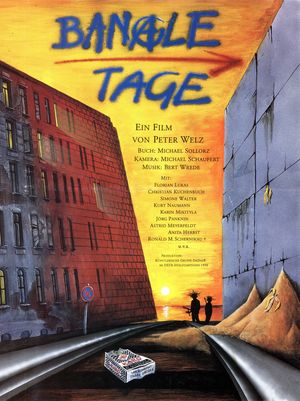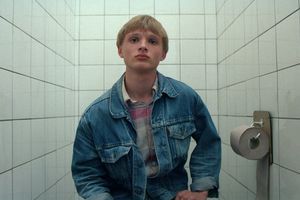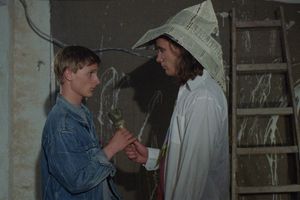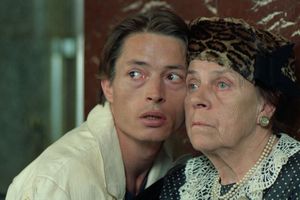Banale Tage
Director: Peter Welz, 92 Min., Color, Feature Film
Deutsche Demokratische Republik (DDR)
DEFA Studio Babelsberg GmbH, 1990
- Film/Video Format
- 35 mm
- Length in m
- 2523
- English Title
- Banal Days
- Premiere Date
- Release Date (for Cinema)
- Literary Source
- Sollorz, Michael: "Banale Tage", Erzählung

(Dir.: Peter Welz, 1990)
Short Summary (English)
In East Berlin in the late 70s, two boys meet one evening in a disco: Thomas, who is from a working class family and is doing an apprenticeship, and Michael, a 16-year-old school pupil from an educated middle-class family. They both miss the tram home and walk together instead, ending up at Michael’s house where they discuss God and the world into the early hours. Following this encounter the two boys enter into an unusual friendship, united by their mutual desire to get away from the phoniness, the limitations and the restrictions of their parents and of society. In the end, Thomas comes up with the idea of squatting in a flat with Michael so they can finally be independent. But whilst for one of them it’s merely a provocative game, for the other it becomes much more serious…
Director Peter Welz describes BANALE TAGE as an encounter of the banality and the eccentricity of everyday life. He doesn’t want the film to be seen as embittered and sceptical, or as sentimental and nostalgic. What he’s much more interested in is the topic that crops up time and time again; the youth’s struggle against the constraints and conventions of society.

(Dir.: Peter Welz, 1990) Photography: Michael Schaufert

(Dir.: Peter Welz, 1990) Photography: Michael Schaufert
Film Crew
- Director
-
- Peter Welz
- Script
-
- Michael Sollorz
- Scenario
-
- Michael Sollorz
- Camera
-
- Michael Schaufert
- Film Editing
-
- Rita Hiller
- Cast
-
- Florian Lukas (Michael)
- Christian Kuchenbuch (Thomas)
- Kurt Naumann (Peter Wagner)
- Karin Mikityla (Hanna Wagner)
- Bärbel Bolle (Frau Torf)
- Ernst-Georg Schwill (Herr Torf)
- Jörg Panknin (Lehrmeister Vogler)
- Astrid Meyerfeldt (Frau Boll)
- Simone Walter (Karin Schulz)
- Anita Herbst (Gardobiere Schulz)
- Herbert Olschok (Glatzkopf)
- Ronald M. Schernikau (Schauspieler Bernd)
- Peter Prager (Regisseur)
- Rolf-Peter Kahl (Klaus Pütz)
- Stefan Kolosko (Marek - "Der Beste")
- Michael Klobe (Sigmar)
- Paul Berndt (Pfarrer / Minister)
- Hanno Harnisch (Mann mit Hut)
- Gerhard Hähndel (Die "Zwei")
- Maximilian Löser (Die "Zwei")
- Lusako Karonga (Ali)
- Torsten Kirchner (Mitglied "Junge Gemeinde")
- Jürgen Korth (Mitglied "Junge Gemeinde")
- Sven Lehmann (Mitglied "Junge Gemeinde")
- Anke Pätsch (Mitglied "Junge Gemeinde")
- Joachim Stargard (Kellner / Sportlehrer)
- Peter Hoff (Physiklehrer)
- Heiner Rosch (Lehrling)
- Alexander Schubert (Lehrling)
- Jesko Klandt (Lehrling)
- Frank Rothe (Lehrling)
- Kathrin Waligura (Schauspielerin / Krankenschwester)
- Bernd Junge (Plakatkleber)
- Bianka Scharf ("Kichererbse")
- Ulrike Stamm ("Kichererbse")
- Frank Haberland (Stunt)
- Tanzkreis Maschwitz (Premierenbesucher)
- Keimzeit (Musikgruppe) (Bluesband)
- Jenny Kramp ("Kaktusmädchen")
- Julia Richter (Frau im 1. Stock)
- Assistant Director
-
- Sybille Junge
- Alexander Zschiedrich
- Hans-Georg Andres (als Gast)
- Assistant Camera
-
- Dietrich Pohl
- Production Design
-
- Katrin Esther Ritterbusch
- Script Editing
-
- Timothy Grossmann
- Music
-
- Bert Wrede
- Sound
-
- Jürgen Mathuschek
- Werner Schulze
- Brigitte Pradel
- Konrad Walle (Tonmischung)
- Costume Design
-
- Ulrike Stelzig
- Make-Up
-
- Harald Jahn
- Hannelore Seruns
- Babette Bröseke
- Props
-
- Hans-Joachim Bauer
- Marco Mienerski
- Michael Koch
- Production Management
-
- Ralph Retzlaff
- Unit Production Management
-
- Frank Lamla
- Bernd Marx
- Rudi Korte
- DEFA Photography
-
- Herbert Kroiss
Awards
- Filmfestival Max-Ophüls-Preis Saarbrücken (23.-27.01.) (1991): Preis der Interfilm-Jury
Short Summary (German)
Ostberlin, Ende der siebziger Jahre. Der sechzehnjährige Schüler Michael und der Werkzeugmacherlehrling Thomas sind Freunde. Als ziemlich unterschiedliche Typen haben sie doch eins gemeinsam: sie wollen dem Mief in Elternhaus, Schule und Betrieb entfliehen. Ihr Aufbegehren ist ein grotesker Trip durch den banalen Alltag. Thomas bricht eine leerstehende Wohnung auf, quartiert sich ein. Er verteilt Flugblätter, die niemanden interessieren, außer den Staatssicherheitsdienst, der ihn mitnimmt. Michael sucht seinen Freund, als er von einem Besuch seines - schöne Sprüche klopfenden - Dramaturgen-Vaters von der Ostssee zurückkommt.
(Quelle: Das zweite Leben der Filmstadt Babelsberg. DEFA-Spielfilme 1946-1992)



